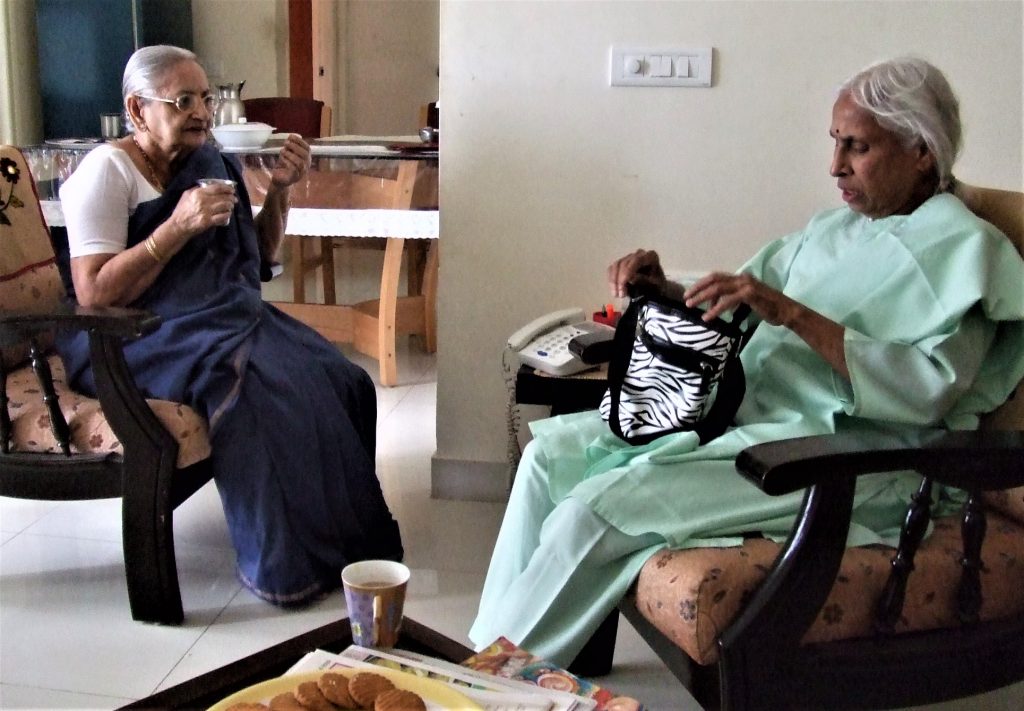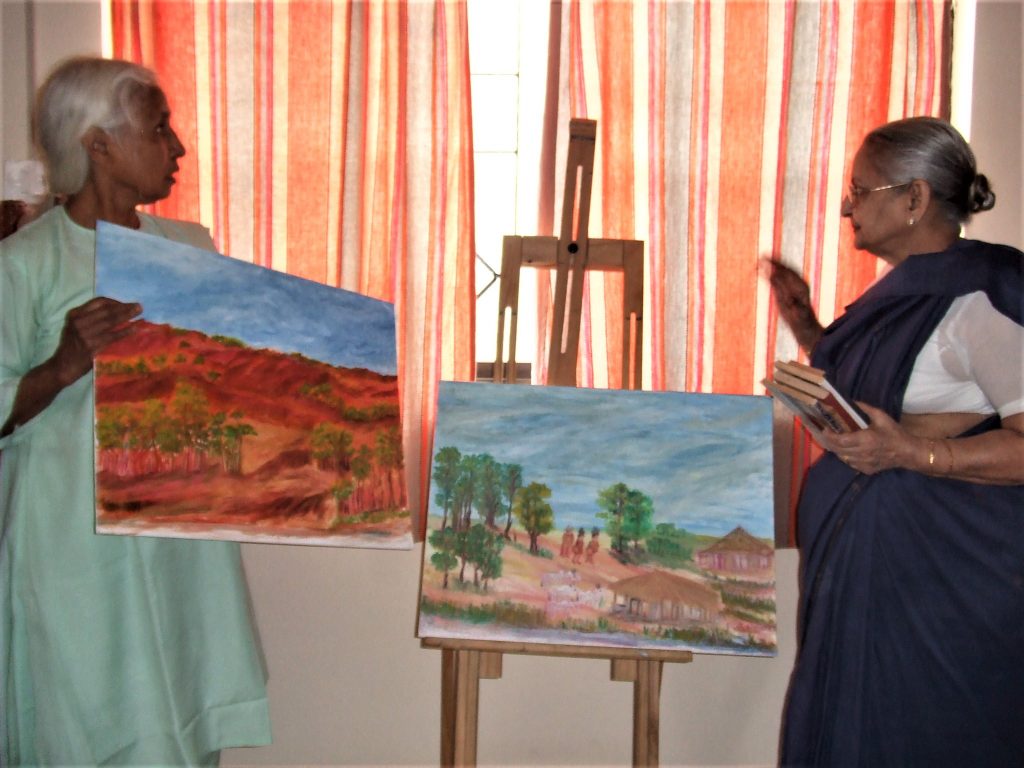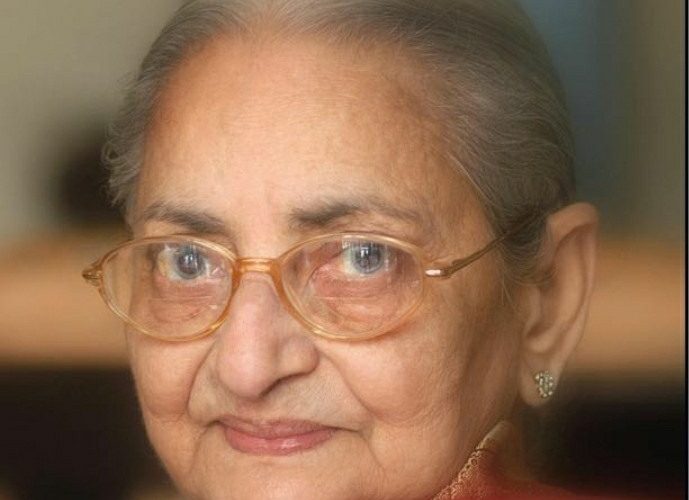Telugu: Sivaraju Subbalakshmi
Srimati Sivaraju Subbalakshmi is a writer in her own right and artist; of small stature and strong will. I watched her express her strongest views with a little smile and in a gentle voice. Current readers may not accept her views but should admire her for her strength of will in expressing them. She was admired by reputable male writers and appreciated by discerning readers.
At 84, she continued to enjoy cooking, believed kitchen was an important part of home, and continued to write. “For my writing,I take the papers my grandson brings home for his work, just like a little girl. I AM a little girl,” she said, with a smile. At the time I met her, she was writing her experiences, about famous literary personalities she had met, and places she had visited.
Sivaraju Subbalakshmi garu lived a life full of zest and creativity. She is one of Telugu writers that should be cherished forever.
*
I took the train from Delhi to Bezwada, my hometown. It was a second class ladies compartment. All kinds of people were getting in and out of the compartment. Right away, watching them became my pastime. There was no conversation with anyone but for an occasional “move, please,” or “where to?”
We were only four women in the compartment. One woman was sleeping on the upper berth. Another woman occupied one entire corner with her children and her luggage. From her clothing, I assumed she was an Anglo-Indian. Another woman had been buying snacks and eating them, with no break to her mouth, and assigning the job of throwing out the leaves, the skins, and the wrappers to whoever happened to look in her direction. Her clothes appeared to be that of a south Indian. She wore a sari with horizontal stripes, and a pair of shiny earrings; she had large lips; her hair was shabby and curly; she was short; and, her face shone whenever she laughed. Ah, I forgot to tell you about the woman who sat next to me. She was tall and skinny; her skin was a kind of discolored white; she had small eyes, long nose, and lips like a sketch of straight lines; her hair was straight and smooth—each feature by itself looked okay, but on the whole, her face was lifeless. We could tell she was a Gujarati, based on the clothes she was wearing; and then, of course, me, sitting in another corner.
Each time the train stopped, somebody or other was asking “What station?” in Hindi, and somebody else was replying accordingly. In between, whenever the fat lady leaned toward the window to buy snacks, her massive body was smothering the child, and the child was screaming; then the mother yelled at her in English. After a while, both settled in their seats, making ugly faces and taking sneaky peeks at each other without one noticing the other until more new faces popped up in the compartment. They stopped bickering and started watching the newcomers.
I was sitting by the window buying whatever I felt like. Unlike the fat lady, I did not have to bother anybody. I sat there watching the trees as if they had come to say goodbye to me; I craned my neck to peek through the window. I was sad to leave them behind; their shadows seemed to be waving to me and saying, ‘take care’.
Several stations had come and gone. People were getting in and out, a few at a time. Some of them were cursing us, each in their own language, because we stuck to our seats without budging, not even a bit. They seemed to be hell-bent on finishing the fight and asserting their rights; instead, they remained at the door waiting for their destination. They got off when their station arrived but only after throwing a nasty look at us, as if saying, “we’ve to go, or else, we would’ve seen the end of you all. Our bad luck!”
I was not sure when I’d fallen asleep, not sure how many stations had passed. I woke in Nagpur station; my eyes were still shut though. Two women got in with a little girl, who looked like a baby rat, seven or eight boxes, two rolls of bedding, four or five baskets, and a few other sundry items, and started shoving them around. A man, who came to see them off, kept pushing my legs with the bedding until I turned into a bundle myself.
I was annoyed by their attitude. I kicked the bedding and busted all their hard work.
Whatever they thought, they did not start an argument but moved their bedding to another side … One of them laid the kid down and made room for the other woman to sit. Her eye landed on the space in between. “It’d be nice if this ‘chariot’ moved a bit and made room for us”, one of them said and they all giggled at their own sense of humor.
That “chariot” woke, gave them her invaluable opinion in her language, that they must not put their luggage in her space; they’d better put them in the corner where all the other pieces were kept. She returned to her sleep. The newcomers took her advice, moved the two boxes to the corner. In the process however, one end of the box hit one woman, who, in turn, kicked the box with all her might. The woman with the box fell on the “chariot”, cracking her bangles in the process. She said sorry and got off of the “chariot”. The “chariot” cursed them in her polite language and in a high pitch.
My ears were nearly blasted off by what had followed—the guard blew the whistle, the man, who came to send them off, panicked, turned around, slipped and fell on the platform.
The two women inside the compartment started hollering, “Oh! No, no. Are you hurt?” We must be crazy for starting out this morning of all the days; should’ve picked the first class compartment. Then, we wouldn’t have all this hassle,” and so on.
“I’m fine, you be careful,” he said. The train started to move.
“We’ll wire you as soon as we got there,” the women inside shouted.
The train honked. The guard whistled. The entire hullabaloo pierced through my ears.
The second woman stood for a while, no guts to go elsewhere, I suppose. Then she lifted my sheet a little, sat down, and pulled the sheet over her lap.
It was quiet for a while.
By the time I woke again, the Anglo-Indian woman and the other two, who had gotten in last, were bickering loudly. I sat up, mechanically. The train stopped at some big station. I understood the real problem finally—the Anglo-Indian lady’s hand hit the other woman’s water jug and broke it. The squabbling started thus.
The guard came. The Anglo-Indian lady was whining. The guard said something to both of them and left.
The squabbling subsided. Two more women got in, looked around, laid their eyes on the woman in the middle, tapped on her shoulder, and woke her. The woman looked at them as if she wanted to fight them, opened her mouth, looked at their sizes, changed it into a yawn, moved and made room for them. Within a second, we could see that their attitudes were a notch higher but not lower than hers.
The women, who had gotten in before, were jealous since this woman lying on the seat did not make room for them. They said to the new arrivals, admiringly, “She gave you the space only because you are YOU. Do you know what a rumpus she’d raised with us earlier! She is acting like she owns the compartment”.
The new arrivals kept eyeing us—the woman across from them, the one lying down, and me—and kept grousing. The woman across from me told the one next to me how she could make herself comfortable. Taking her advice, the woman next to me stretched her legs across my body to the window, and settled down to sleep.
I wiggled restlessly. Her legs slipped slowly from my chest to my waist and into my lap. I was ticked off. I whacked her rudely.
She was pretending to be asleep. She jerked, woke, and said grumpily, “Why whack so hard? You can say it gently, can‘t you?”
“You’re sleeping like a log; you don’t even know your legs are in my lap. How can I wake you gently?” I said.
“I was asleep and my legs slipped. What’d you suggest I do?” she said.
“I suggest you keep your legs to yourself,” I said.
“Oh, you think you’re smart. You keep your mouth to yourself and talk.”
The other two jumped in and supported her.
This went on for a while. The woman on the upper berth, probably out of pity for me, started arguing with them. She looked frail but the words from her mouth were flying with full force. The other two were thrilled, supplied a few more choice words to her to their hearts’ content.
I noticed more people were on my side and I raised my voice too. Other travelers were getting in and out of the compartment in between. They looked at the two women and us, and were flabbergasted. The squabble spread into several other totally irrelevant areas. Each one said whatever came to her mind, making fun of everything—from the clothes to the jewelry one was wearing. It went on for a while.
Then, it was time to eat. The train pulled into some station. Everybody tried to move closer to the windows and the door. Somebody stumbled on one of the boxes and kicked it effortlessly, as if it was a small ball. The box’s owners could not assault her. They looked at each other; one of them said to the other, “Oh, no! It’s full of glass items. I’m worried, thinking what could’ve happened to them.”
Their looks annoyed the woman who kicked the box. She let them have it, “What do you want me to do? Who asked you to bring so much baggage? You kept them in the way. Who can put up with that stuff? If they’re broken, throw em out.”
Her attitude made the two women scowl. They remained quiet though.
They started ordering whatever they felt like eating. I took chappati. The two women with the luggage brought food in carriers. They said, showily, “we don’t eat all kinds of stuff you get everywhere.” They looked at me, and said, “We can’t eat those chappatis, they’re like leather.”
The women sitting across from me also brought chappati, I believe. They said, “These chappatis taste lot better than that stale food. Who knows how old that is.”
***
We reached Bezwada early in the morning, still swapping a few small words but no huge bickering.
I was looking for my husband through the window. I saw our servant Guravayya at a distance. He was coming toward my compartment, rubbing his eyes. I was ready to leave but had to wait until the two women unloaded all their luggage. Does the train wait that long? It’s in the hands of god only! I thought I would not have the time to say goodbye to my fellow travelers later. I said, “Goodbye” to them, while still on the train.
They said, “You get down. We’ll pass the luggage to you.”
I looked around for a way out.
They suggested, “Step on the boxes and walk out.”
Another woman suggested, “Why walk on them? Just kick them out. We’ll have more room.”
The boxes’ owner grumbled, “What do you’ve got to lose?”
I did not have much luggage. I took my one box in my hands. The woman next to me handed me my bedding, the small basket and the carry on bag.
I saw Guravayya and told him to take the luggage.
He said, “Ayya garu didn’t say anything about you coming, ma’am. He said he’d got some telegram, some ladies are coming with luggage. He told me to bring them home. Now I can’t see ayya garu anywhere. .. I’m looking for ayya garu.”
“All right. Let’s go. The train’s here for quite some time now. Maybe they’ve left.”
“Don’t I have to look for them one more time? Maybe, it’s okay since you’re here. If you tell ayya garu, he’ll not yell at me. Let’s go,” he said.
I looked at the women in the compartment again, waved goodbye, and walked outside.
“Amma garu, our car is here. I’ll put the box here, you can sit on it,” he said.
“You bring two rickshaws. We don’t know how many of them are coming. Is the house locked?”
“No Amma garu. The cook is home, you know,” he replied.
I came home, finished the chores, took bath, and had Guravayya sweep the rooms and tidy them up. It was past 7:00. No sight of “he”, or, “those who are supposed to be coming.”
Guravayya said he wanted to go home and left.
The kanakambaram plants wilted. I squatted to hollow around the roots.
The cook came and said, “I’ll do it, Amma!” He heard the car honking and went to open the gate.
The luggage filled one half of the front room. I heard my husband’s voice, “Are all the pieces in?”
“Abbha! One should never travel in a ladies compartment, I must say. I’ve learned my lesson. One half of the luggage has been ruined,” one of the guests was lamenting.
My husband called the cook and asked, “Is Guravayya back yet? Where’s he?”
“He came back with amma garu and went home.”
“Amma garu is back? Where’s she?”
“By the plants in the backyard,” the cook said.
“What is this? You’re home, no letter, nothing?” my husband said to me.
“I’ve written, maybe, you didn’t see it. Even if you’d seen it, you’ll send only Guravayya to the station. I saw him in the station and came home with him,” I said.
He turned pale, stared at me, and said, “Rani garu is angry, I suppose. Look, my friend’s wife and his sister are here. See if they need anything. They are chewing me up since morning.”
“How would I know what they want. You take care of them yourself.”
He grabbed my hand and started walking, pulling me along with him, “You’re sweet, please, come.”
I pulled back my hand, saying, “What’s this? Fooling around?”.
I peeked into the front room. Guess what, It was the same two women, my fellow travelers in the train. They were sitting on the sofa with their legs up on the table, and relaxed. They put the little girl on the carpet and gave her something to munch. She was crushing the food and splattering it all over the carpet, and on top of it, dabbing her hands, covered with her drool, on the carpet. It was nauseating.
My husband introduced me to them.
They stared at me, probably they also were annoyed. They had that look on their faces—the same “SHE! Do we have to put up with her here too?” look.
“They’re here too,” I was thinking. The older woman collected herself and started lecturing on the friendship between her husband and Rama Rao (my husband) in great detail. She said her husband had sworn that he would not attend Rama Rao’s wedding if the bride had not been his sister, and it had not happened only because the horoscopes had not matched; or else, it would have been impossible for anybody to stop the wedding, and for that reason, she had had full rights in this house! She went on like this for a while.
The cook brought coffee and served to them. She, sipping coffee, continued to tell how crazy Rama Rao had been about her husband’s sister. She said to Rama Rao, “She still has the saris you’d sent to her from Benares. She keeps them as precious.”
Rama Rao, changing the subject, said, “There’s a lot see in this town. You may want to get ready quick. Or else, you will not have time to see all the places.”
”What’s there to see here, anyways? We’ll just go to the temple and be back,” she said, leaning back in the sofa. He might be thinking that she would not stop if she started on her pet subject again. He left the room saying, “I’ve to take bath.”
By the time they were ready to go, it was past 10:00. He asked me to go with them.
“I’m not feeling well, I can’t go,” I said.
“Since you’re staying home, I can leave the child here. What’d you say?” the younger woman said.
I was boiling inside for all their talk. I said, “I’m no good with kids. Take her with you.” Then, I added, “He’s there to carry the baby, if she cries,” thereby settling the score with my husband.
They were back by 2:00 in the afternoon.. Rama Rao was used to eating early; late meals would give him headaches.
They sat down to eat. “Amma saapada ille (did not eat),” the cook said in Tamil.
“Call Amma,” Rama Rao said.
The cook came to me and said, “Ayya garu is calling you.”
I went into the kitchen, sat in front of a leaf, away from the rest, and started eating without speaking one word.
The older woman was hassling the younger one. “You two would not leave the temple. It was such a struggle for me to keep the kid quiet. Had you gotten out early, we would have visited them (other friends) too.”
Her words jabbed me at my heart. Whenever I asked my husband to go to the temple with me, he would say, “you go.”
The younger woman said, crossly, “Ha, like you don’t take time to get ready, you’re pointing fingers at me. Anyway, me traveling with you, why on earth did I do that?”
It was 4:00 by the time they were done arguing. “We’ll take the night train, not this one,” they said. They sat on either side of Rama Rao and continued to blabber again.
They got ready to leave after finishing the supper at night. I kept avoiding them—saying I was not hungry to eat, not feeling well to go to the station …
The train was late, I suppose. It was very late by the time my husband returned home. I put the cot in the yard and lay down, dozed off
He came in, brought another cot, laid it next to mine, and lay down. He fell asleep soon enough. Earlier, I was thinking of what I wanted to say to him, had he asked. Now, not only he did not wake me, he slept without a care in the world. It made my blood boil. I wanted to jump and dig my nails into his skin. I kept rolling on the cot as if I was rubbing off my anger on the bed. Finally, he pulled his cot closer to mine, gently patted me and laughed. I fell asleep, not sure when.
It was quite late in the morning. I woke. He was not on the bed. I fell asleep again. I heard a horse-drawn cart in the front yard, raised my head to see who it was.
The two women were back with their luggage. My mind was empty, not a single thought in it. After a while, I started thinking clearly—how come they’re back?
They both started cursing and screaming at the cart-driver because he asked for more money. He too was firing back. With all the noise, my husband woke and looked at me, puzzled. I pointed toward the guests. He was also confused, wondered how this could have happened—they showing up at our door again? He lay back on the cot.
The older woman came in gasping, and told him, “See how he’s talking! No manners at all. Kick him out.”
The younger woman managed to pacify the cart-driver and send him away. She came in, walking daintily like a movie star. She said only she could send him away and that nobody ever listened to the older woman. That set off the older woman into a fit of crying. Both started bickering again.
I went into the kitchen. My husband followed me, trying to say something.
The older woman came in, ranting as always, “The baby’s crying for milk. Tell the cook to bring some milk.”
The cook brought coffee for all of us.
Then, the older woman told us what had happened earlier. They had met another man on the train. He asked them where they were going. The two women told him that they were going to attend a wedding; they told him the name and the surname of the groom’s father. The man said, “Oh, no. They all had left for Tirupati yesterday. The wedding will take place on the hill. Don’t you know?” The two women were worried, what now. Then the same man suggested that they could get off this train, and go back to Bezwada on the next train and go to Tirupati the next day. With his help, they moved from this train to that train and suffered quite a bit in order to get back to our house.
My husband said,“Had you taken the passenger train, you would’ve reached Tirupati by night.”
The younger woman said, “No way I can travel again. If she wants, she can go”, and lay back in the sofa and closed her eyes.
The older woman said,“What kind of talk is that? We came here for the wedding. It’s not nice to go back without attending the wedding. Isn’t that right, Ramu?”
My husband said, “You must go. It wouldn’t be nice if you don’t go.”
The younger woman was stubborn. She said, “Whether it is nice or not, I’m not going.”
Rama Rao said with a faint smile, “If you don’t feel like going, okay, cancel it.”
I pretended as if I had something to do in the other room, went in, returned with an invitation and asked my husband, “You didn’t tell me about Venkatesam’s wedding.”
“Oh, I forgot. It is not too far. We can go by car,” he said.
The older woman said, “She can go,” pointing to me.
Rama Rao said, the bride was actually his relative, and so, he must attend the wedding. He said to me to pack for the trip.
“If you’re gone, what is the point of our staying here? Let’s go,” the older woman begged the younger one. She asked if Rama Rao could put them on the passenger train first and then go to the wedding.
The younger woman turned to Rama Rao and suggested that they could leave some luggage here, and that would allow them more time to straighten their boxes.
Rama Rao looked at his watch, “No time. Even otherwise, your luggage is not much compared to the boxes the wedding party will have. I’ll help you with loading here, and on your way back, the wedding party will take care of it.”
He called the cook and told him to bring a horse-drawn cart and help load the boxes. and came in. I was sitting on a box, thinking what I should say if the two women asked, “May we come again?”
“What are you thinking? Come, get up,” he took my hand and pulled.
“You go with them to the station. After you return, we can go to the wedding from here,” I said.
“Come on,” he seized my hand and pulled again.
“Wait. Let me change into another sari,” I said.
By the time everybody was ready, it was time for the train. We rushed to the station. My husband ran to the counter, bought the tickets, and put them in the ladies’ compartment. He said there was more room in it.
“Hey, Rama Rao.” We heard somebody call from behind.
Parvatamma came to us, gasping.
“Where are you going, Kodalaa[i]!” she said, addressing me.
“You get in first. There isn’t much time,” my husband held Parvatamma’s hand and helped her into the compartment.
“Son, this is upper class, I think. Here, look, my ticket is not for this compartment.”
“You get in. We can pay the difference and change it to this. There is no time to find another compartment,” my husband said and took the ticket to the guard for exchange.
“Why aren’t you aboard?” Parvatamma asked me.
I told her that we were not traveling, and that we came only to send off our friends, and asked her whether she was attending Venkatesam’s wedding.
“I am coming from there only. I went there last week. The wedding has been canceled. The bride’s grandmother died suddenly. I think your husband knows about it too. Venkatesam said he had told him.”
“I don’t know. I was out of town, returned just yesterday. The train is moving. Be careful,” I said.
My husband came rushing and handed her the ticket.
Parvatamma would not keep quiet. “You do know that Venkatesam’s wedding has been canceled, don’t you?” she asked him.
My husband looked at the two women, fearing they might hear this conversation. They were busy spreading sheets so they would not have to get up when others got into the compartment.
My husband walked along the moving train, and said to them, “See you next time.”
“Many thanks. We’ll come again, and will not leave until we had spent a few days with you,” they said.
“Of course, you must,” said my husband and waved.
Parvatamma shouted, “Santha, see you later. Son, you must come to Bapatla to visit us.”
The train left. My husband and I did not speak to each other until we were outside the station.
He told the cook to go home and make supper for us, “We will be home later.”
“I’ll go home now,” I said.
He said, “Stop grouching. Get into the car.”
I sat in the car, a little away from him.
“It seems the wedding has been canceled, you know,” I said.
“I don’t know. I said that only to send them away.”
“That’s a lie. You’re acting like you don’t care about them. If you don’t, how come you walked along the moving train and talked to them. If you cared about her so much, you should have married her only. Why did you marry me?”
“To tease you,” he laughed.
“And they teased you?”
He burst into a big laugh.
***
(The Telugu original, Aadavaalla pettelo prayaanam, has been published and included in the anthology, Sivaraju Subbalakshmi kathalu.(1998). This translation by Nidadavolu Malathi published on thulika.net, March 2010.).


photos: V.B. Sowmya









[…] Traveling in a Ladies Compartment […]
Wonder how many of the readers here would be able to connect with those times of ‘ladies compartment’, bedding rolls and boxes. 🙂 The subtle love between ‘ayya garu’ and ‘amma garu’ captured well. Will have to remember to read the original in Telugu.
Good question. I have similar thoughts. Current readers are so much taken up with and pride themselves on their knowledge of world literatures and cultures, but pay very little attention to our literature and culture. No attempt to learn and appreciate our culture. Even worse is assessing the past with current evaluation tools.
The Telugu original is available on kathanilayam, I think.
Thanks for sharing your thoughts.